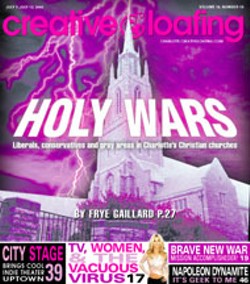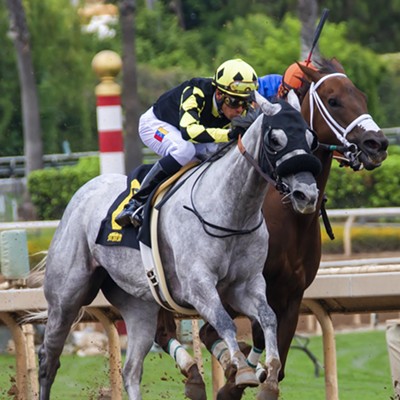Page 4 of 8
Jones, for his part, continues to beat the old drums of compassion. "I'm a leftover from the 60s," he explains. But he also believes that Charlotte has now become a different place. There once was a time when there seemed to be many more voices like his own -- in the white community, Owens, Oldenburg and the rest, and in the African-American pulpits, people like George Battle and Leon Riddick. And even if there are similar voices today -- Steve Shoemaker popped immediately to mind, and Rabbi James Bennett of Temple Beth El -- it is not as clear who is paying attention.
To Clifford Jones, that is the most fundamental of ironies. Charlotte, he says, is no longer the same Southern city that it was, no longer as cohesive, and as it has changed, it has become less compassionate -- less sensitive, he believes, to people in need, including, of course, its racial minorities.
"On the heels of the civil rights movement," he contends, "there seemed to be a sense and a desire to do what was right -- if not for right's sake, then at least for image sake." It was a civic morality under girded by faith, but Jones doesn't see it as much any more. As Charlotte has grown, and people have begun to move in from other places, he thinks that something important has been lost.
Andy Baxter agrees. Baxter, an ordained Methodist minister, is executive director of Mecklenburg Ministries, a loose alliance of church people in Charlotte who are seeking to raise issues of justice and reconciliation. Baxter says it keeps getting harder during a time of terrorism and violence, a time when the world is coming unglued.
But he also thinks that here in Charlotte, something even more basic is at work. The community has grown at a breakneck pace, and now in the far-flung reaches of the county, there is a massive, pervasive sense of isolation. As a native of Charlotte now in his 30s, Baxter can think of only two occasions in his adult lifetime when there was a feeling of connection that spread through the area. The first was the aftermath of Hurricane Hugo, when people were linked by the effort to clean up. The second was more recent -- the Super Bowl run of the Carolina Panthers, when Jake Delhomme and his band of brothers captured the imagination of the city.
But such moments are fleeting, and during ordinary times people are simply caught in the rush. That is why, Baxter thinks, ministers like James Howell, no matter their eloquence, have a difficult time being heard. This is a time when people don't want to be prodded to think, or to confront the uncomfortable implications of their faith. They don't want to hear sermons about loving their enemies or taking what they have and giving to the poor. They are looking instead for reassurance and certainty, and to the extent that they find it coming from the pulpit, it is coming most often from conservative churches.
"I think 9-11 changed the ballgame a lot," says David Chadwick, minister at Forest Hill Church in southeast Charlotte. "There are now a lot more people looking for answers, and conservative churches are giving answers that liberal churches don't."
Certainly, it's true that for more than 20 years in Charlotte, conservatives have played a major role in the public debate, dispensing their own understanding of the truth with a fiery certitude that among other things has dominated the newspaper headlines. Some say it began with Joseph Chambers, minister at the Paw Creek Church of God, who began attracting attention in the 1980s with his public crusades against pornography. He picketed outside the Charlotte Observer, accusing the paper of being soft on the issue, and later he picketed a local theater that was showing The Last Temptation of Christ.
Later in the 80s, the conservatives were out in force again as part of the demonstrations by Operation Rescue, a militant anti-abortion group that tried to blockade the doors of the clinics. They were supported by ministers such as Harry Reeder from Christ Covenant Church in Matthews, and as the controversy swirled, the conservatives continued to become more visible.
Then came the 90s, when maybe the most prominent conservative of all suddenly burst onto the scene. He was not a minister this time, but a passionate layman who emerged from the pews of Calvary Church, the great cathedral on Highway 51, to assume his place as one of the most strident voices in the city. Bill James makes no apology for that.
Speaking of News_.html, 5.00000
-
A Family Affair
Dec 12, 2007 -
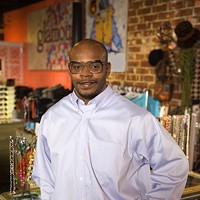
Darrell Roach
Dec 12, 2007 -
Body Talk
Dec 12, 2007 - More »
Latest in Cover
More by Frye Gaillard
-
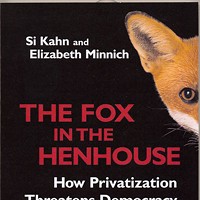
Efficiently Careless
Nov 2, 2005 -
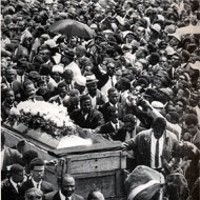
Where The Action Was
Jun 1, 2005 -

Curtis Turner, A Great Driver
Mar 23, 2005 - More »
Calendar
-

Wine & Paint @ Blackfinn Ameripub- Ballantyne
-

Face to Face Foundation Gala @ The Revelry North End
-
An Evening With Phil Rosenthal Of "Somebody Feed Phil" @ Knight Theater
-
Kountry Wayne: The King Of Hearts Tour @ Ovens Auditorium
-

Queen Charlotte Fair @ Route 29 Pavilion
-
Canuck in the Queen City 7
A Canadian transplant looks back at her first year as a Charlotte resident
-
Homer's night on the town 41
If you drank a shot with the Knights mascot on Sept. 20, you were basically harboring a fugitive
-
Delic Holdings Inc. Announces Meet DELIC, the Premiere Psychedelic and Wellness Edutainment Event and Expo for Newcomers and Veteran Psychonauts, Announces Initial Speaker Lineup 42

